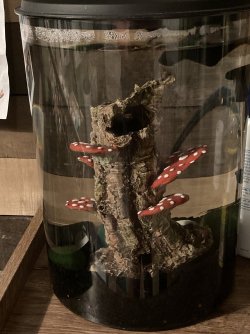@kateh, what size is your tank?
Cycling may not be the best way forward if your tank is small, they can be difficult to establish and maintain a cycle.
See this excerpt from the betta care guide-
Cleaning and Maintenance: Betta tanks, no matter their size, require regular cleaning. In an uncycled betta tank, one must do frequent water changes. The frequency and amount of water changes depends on the size of the tank with smaller tanks needing water changes more frequently than larger tanks.
In a properly cleaned betta tank, ammonia and nitrite should both be 0 parts per million (ppm) with nitrates being as low as possible.
Cleaning Schedule by Tank Size (for uncycled tanks)
1 gallon -- 100% water change every 2 days
2.5 gallon -- 100% water change every 4 to 5 days
5 gallon -- 100% water change once every 7 days
(In a large, cycled tank [established, not currently cycling] you should change roughly 25% of the water weekly using a gravel vacuum, and test your water parameters often; ammonia and nitrite should be 0 ppm, while nitrate should be kept at less than 20 ppm.)
Cycling may not be the best way forward if your tank is small, they can be difficult to establish and maintain a cycle.
See this excerpt from the betta care guide-
Cleaning and Maintenance: Betta tanks, no matter their size, require regular cleaning. In an uncycled betta tank, one must do frequent water changes. The frequency and amount of water changes depends on the size of the tank with smaller tanks needing water changes more frequently than larger tanks.
In a properly cleaned betta tank, ammonia and nitrite should both be 0 parts per million (ppm) with nitrates being as low as possible.
Cleaning Schedule by Tank Size (for uncycled tanks)
1 gallon -- 100% water change every 2 days
2.5 gallon -- 100% water change every 4 to 5 days
5 gallon -- 100% water change once every 7 days
(In a large, cycled tank [established, not currently cycling] you should change roughly 25% of the water weekly using a gravel vacuum, and test your water parameters often; ammonia and nitrite should be 0 ppm, while nitrate should be kept at less than 20 ppm.)




